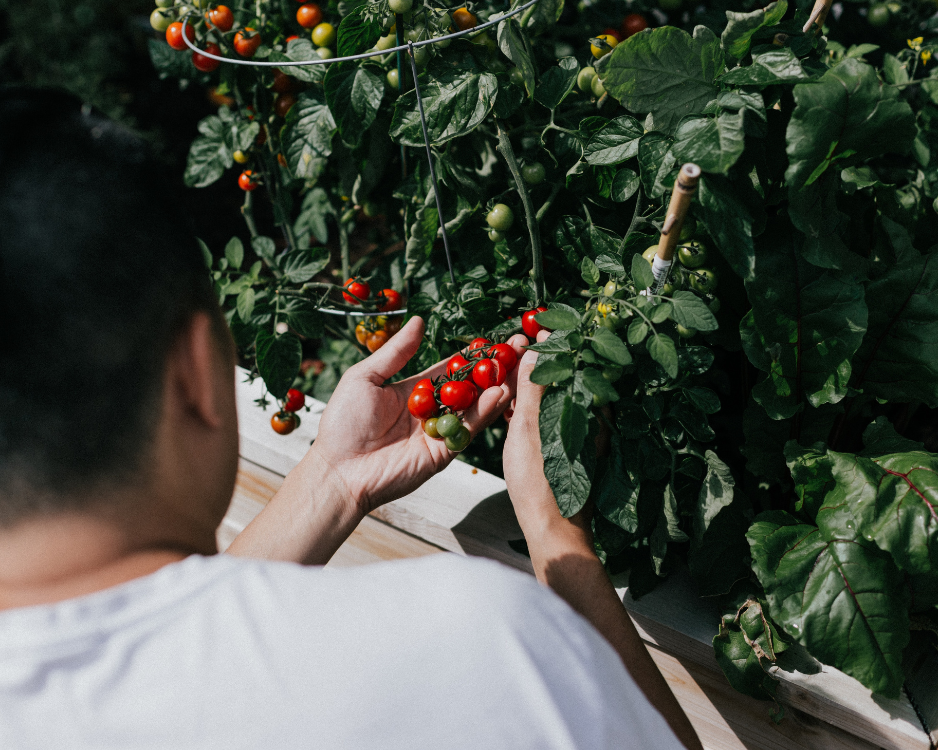
The Green Thumb Guide: How to Grow Your Own Vegetables Successfully
Introduction:
Growing your own vegetables is an enriching and rewarding experience that connects you with nature and provides you with fresh, healthy produce right from your backyard. Whether you have a sprawling garden or a small balcony space, growing vegetables can be adapted to fit your environment. This guide will walk you through the basics of vegetable gardening and highlight some of the best veggies to start with.
- Setting Up Your Garden:
Choose the Right Location: Most vegetables need at least 6 hours of sunlight per day. Find a spot in your yard or balcony that receives ample sunlight. If you're limited in space, consider container gardening.
Prepare Your Soil: Good soil is the foundation of a successful garden. For in-ground gardens, enrich your soil with compost to provide nutrients. For containers, use high-quality potting mix.
Select Your Vegetables: Start with easy-to-grow vegetables like tomatoes, lettuce, carrots, and bell peppers. Consider what you like to eat and the climate of your area.
- Planting Your Vegetables:
Timing is Key: Plant your vegetables at the right time. Some veggies, like peas and lettuce, prefer cooler weather, while others, like tomatoes and cucumbers, thrive in warmer temperatures. Check local planting guides for the best times.
Starting Seeds: Some vegetables can be sown directly into the garden, while others are best started indoors and transplanted later. Seed packets provide valuable information about planting depth and spacing.
Transplanting Seedlings: When your seedlings are ready, transplant them to your garden or containers. Be gentle with the roots and water them well after planting.
- Caring for Your Vegetable Garden:
Watering Wisely: Vegetables need consistent moisture. Water early in the morning or late in the evening to reduce evaporation. The amount of water will depend on the weather and the type of vegetable.
Mulching: Apply a layer of mulch around your plants to retain moisture, suppress weeds, and regulate soil temperature.
Fertilising: Use a balanced organic fertiliser to provide your plants with the necessary nutrients. Over-fertilizing can be as harmful as under-fertilising.
Pest and Disease Control: Keep an eye out for pests and diseases. Use organic methods like neem oil or insecticidal soap to manage pests. Keep your garden clean and avoid wetting the foliage to reduce disease risk.
- Harvesting Your Vegetables:
Harvest at Peak Ripeness: Vegetables taste best when harvested at the right time. For example, pick tomatoes when they are fully coloured and slightly soft to the touch.
Regular Picking: Many vegetables, like beans and zucchini, will keep producing if you harvest them regularly.
Handle with Care: Be gentle when harvesting to avoid damaging the plant or the fruit.
- Best Vegetables for Beginners:
Tomatoes: A garden favourite, tomatoes are relatively easy to grow. They need plenty of sunlight and support as they grow.
Lettuce: Quick to germinate and requiring minimal space, lettuce can even be grown in small containers.
Carrots: Carrots are straightforward to grow. They need loose, sandy soil and consistent moisture. You can grow them in deep containers or raised beds.
Bell Peppers: These are warm-season crops that require a bit of patience but are very rewarding. They need plenty of sunlight and warm temperatures.
Spinach: This fast-growing leafy green is perfect for cooler weather and can even be grown in partial shade.
- Tips for Success:
Start Small: Don’t overwhelm yourself. Begin with a few types of vegetables and expand as you gain confidence and experience.
Observe and Learn: Pay attention to how your plants are growing and learn to recognize their needs. Observation is key to becoming a successful gardener.
Be Patient: Gardening is a process that requires time and patience. Not everything will be perfect, and that's okay. Learn from each season.
Stay Organized: Keep a gardening journal. Note what you plant, when you plant, and how things progress. This information is invaluable for future gardening seasons.
- Benefits of Growing Your Own Vegetables:
Healthier Eating: Homegrown vegetables are fresher, more nutritious, and you can grow them organically without the use of harmful pesticides.
Cost-Effective: Growing your own vegetables can save money in the long run, especially if you grow from seeds.
Environmental Impact: By growing your own, you reduce the carbon footprint associated with transporting and packaging store-bought vegetables.
Therapeutic Benefits: Gardening is a relaxing and fulfilling hobby that can reduce stress and improve mental well-being.
Family Activity: Gardening can be a great family activity that teaches children about nature and responsibility.
- Overcoming Challenges:
Dealing with Pests and Diseases: Learn about common pests and diseases that affect your crops. Use organic methods and practice crop rotation to manage these issues.
Weather Challenges: Protect your garden from extreme weather conditions. Use cloches or row covers for protection against cold, and ensure adequate watering during hot spells.
Space Limitations: If space is limited, use vertical gardening techniques or grow in containers.
- Enjoying Your Harvest:
Once you start harvesting, enjoy the fruits of your labour. Fresh, homegrown vegetables are a delight in the kitchen. Try new recipes, preserve excess produce, and even share with friends and neighbours.
- Looking Ahead:
As one growing season ends, start planning for the next. Reflect on what worked well and what could be improved. Consider trying new vegetables or gardening techniques.
Conclusion:
Growing your own vegetables is a fulfilling journey that brings numerous benefits. With the right tools, knowledge, and a bit of patience, you can transform even the smallest space into a verdant, productive garden. Embrace the challenges and joys of vegetable gardening, and relish the satisfaction of eating your own homegrown produce. Happy gardening!





Leave a comment